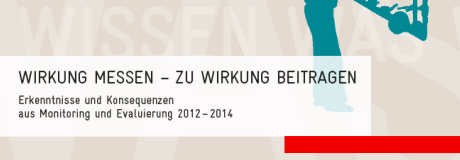
Putting projects to the test: Report sets out the results of GIZ's work
16.10.2015 – Every two years, GIZ evaluates the effectiveness of its work based on standard international criteria. The results speak for themselves.
The work of the Deutsche Gesellschaft für Internationale Zusammenarbeit (GIZ) GmbH helps achieve sustainable development. These are the findings of the latest monitoring and evaluation report, which examined the work of more than 200 projects from 2012 to 2014. Three out of every four projects evaluated received particularly positive results, with 69% receiving a score of 2 (‘good rating, no significant defects’), and 6% going one better with a rating of ‘very good’.
But the point of the report is not to showcase GIZ’s performance. ‘We want to find out and communicate to the public where exactly we are successful. However, it is just as important for us to identify areas that we need to improve,’ says Christoph Beier, Vice-Chair of the Management Board. ‘In order to further boost the effectiveness of our work we need to know what factors determine whether our work is a success or a failure and take action accordingly.’
The evaluation is based on the internationally recognised key criteria of relevance, effectiveness, overarching development results (impact), efficiency and sustainability. The overall rating was 2.2, up from 2.4 in the previous evaluation report. The best rating was for ‘Relevance’, which received a score of 1.5.
As Christoph Beier explains, ‘The evaluation report shows that many of the projects tackle the relevant issues head-on and are effective in sustainably improving the living conditions of people in our partner countries throughout the world.’ The findings of the monitoring and evaluation report, he adds, therefore play a key role in ensuring that the learning process is both transparent and productive. A systematic and structured analysis is vital if GIZ is to continually improve its services in a targeted manner.